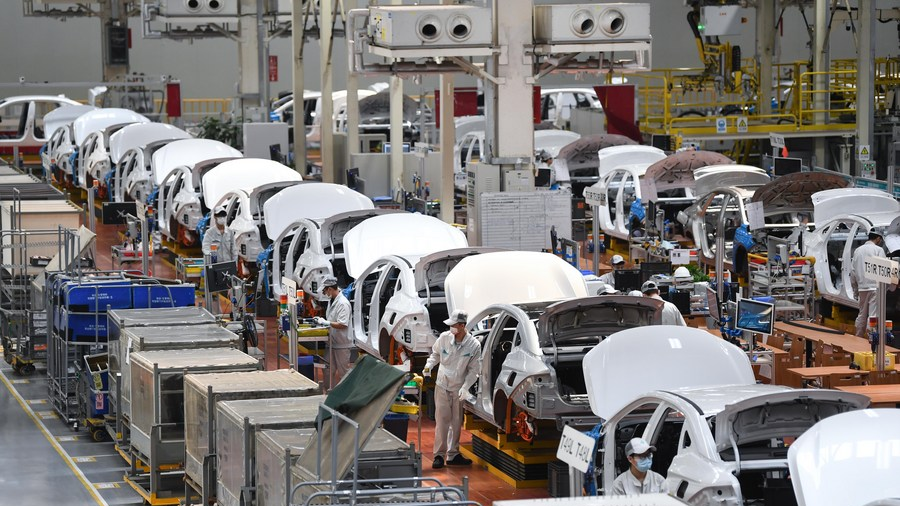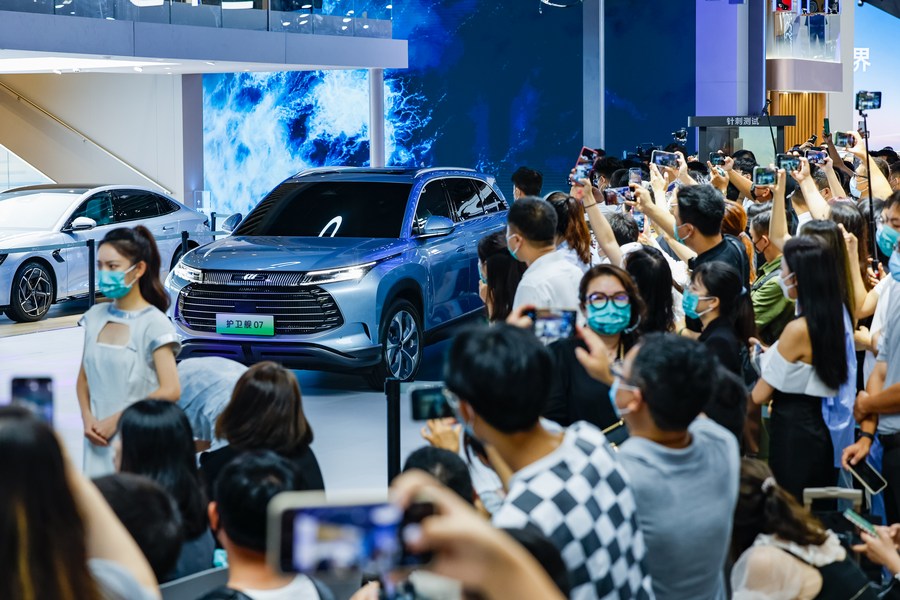
The assembly line of GAC Aion, an NEV subsidiary of Guangzhou Automobile Group Co., Ltd. (GAC Group), in Guangzhou, Guangdong, China, February 24, 2023. /Xinhua
The assembly line of GAC Aion, an NEV subsidiary of Guangzhou Automobile Group Co., Ltd. (GAC Group), in Guangzhou, Guangdong, China, February 24, 2023. /Xinhua
Editor's note: Abu Naser Al Farabi, a special commentator for CGTN, is a Dhaka-based analyst focusing on international politics, especially Asian affairs. The article reflects the author's opinions and not necessarily those of CGTN.
The European Commission, in an apparently jerry-built move, announced recently that it was initiating "an anti-subsidy investigation into electric vehicles coming from China" to determine whether to impose punitive tariffs against "cheaper" Chinese electric vehicle (EV) imports. In her annual address to the European Parliament, the President of the European Commission Ursula von der Leyen explained the reasoning behind the decision by remarking that "global markets are now flooded with cheaper electric cars. And their price is kept artificially low by huge state subsidies."
Despite the fact that it was purportedly made to safeguard European automakers, many in Brussels saw von der Leyen's move, given its unorthodox nature, to launch an investigation into Chinese EV imports into the European market as a political pitch for her reappointment for a second term.
Earlier on September 14, Politico reported that von der Leyen would not be running for a seat in the European Parliament in next year's EU election. However, there is a possibility that she may be chosen as the center-right's lead candidate for a second term as president of the European Commission.
Such a protectionist action, meanwhile, appears absurd on the grounds that it has been unusually pushed ahead by the European Commission, not from any industry complaint. It reeks of a new wave of protectionism sweeping across the Western world.
China, on its part, has strongly denounced the move. "China believes the investigative measures proposed by the European Union are in reality to protect its own industry in the name of 'fair competition'," a statement by the Chinese Ministry of Commerce read. The statement further warned that the decision will “seriously disrupt and distort the global automotive industry and supply chain, including the EU, and will have a negative impact on China-EU economic and trade relations.”
However, be it placed out of the political stunt game or ostensible objective to protect European EV producers, the underlying drivers behind the decision seem to signal something else. It seemingly stems from Europe's desperate endeavors to disproportionately provide competitive privileges to its carmakers as it continues to lose out to China's strong price comparative advantages over low-cost production of electronic vehicles.
As China has continued to excel in the EV industry, it has caused unfounded insinuations stemming from some in the European policy establishment while Europe's carmakers increasingly fretting over China's EV prowess. Europe's carmakers have postured their competition with Chinese EV makers as "a fight on their hands," with a desperate determination to erase China's lead in developing cheaper, more consumer-friendly models.

Visitors take photos of a car from BYD at the Chengdu Motor Show 2022 in Chengdu, capital of southwest China's Sichuan Province, August 26, 2022. /Xinhua
Visitors take photos of a car from BYD at the Chengdu Motor Show 2022 in Chengdu, capital of southwest China's Sichuan Province, August 26, 2022. /Xinhua
China is now a dominant player in the global EV supply chain, including raw materials thanks to Beijing's decade-old industry promotion policy. EU officials have complained for a while that Chinese EVs are being sold in Europe at prices that are 20 percent lower than those of local models, which puts pressure on European automakers to produce cheaper EVs. This sort of claim runs counter to the facts on the ground because Chinese cars that are exported to Europe are typically sold for almost double the price of those sold in Chinese mainland markets.
Additionally, the growing surge in China's new energy vehicle exports and enduring relative competitive advantage the sector enjoys are not due to huge state subsidies, a reason that purportedly prompted the European Commission president to launch the probe, but because of the highly competitive China industrial supply chain resulting from strong domestic market competition.
While announcing the anti-subsidy probe, von der Leyen emphasized that "Europe is open to competition but not for a race to the bottom." But in effect, such a protectionist step and its likely outcomes stand in contrast to the core basis in facilitating healthy competition as Bloomberg reports that the probe may lead to EU tariffs close to the 27.5 percent level already imposed by the U.S. on Chinese EVs.
To be sure, competition is undoubtedly a general aspect of any market. However, when policymakers themselves attempt to alter the competitive landscape with protectionist measures, with an implicit goal to provide one with a market edge over another, it goes against the very norms and regulations of the global free trade rules. As a result, it sets forth an ominous precedent, distorts the supply chain, and denies markets and consumes the benefits of innovation.
To achieve industry excellence, fair competition must be encouraged through truly open market regulations that allow infusion of indigenous comparative innovation advantages from around the world into the market. For healthy competition and sustained advancement of any industry, the market should be allowed to embrace all sorts of competitive edges whoever holds in the globalized world.
Instead of using unilateral economic and trade tools to restrict China's growing progress in electric vehicle market in Europe, the EU should objectively and rationally view the growth of China's electric vehicle industry.
(If you want to contribute and have specific expertise, please contact us at opinions@cgtn.com. Follow @thouse_opinions on Twitter to discover the latest commentaries in the CGTN Opinion Section.)